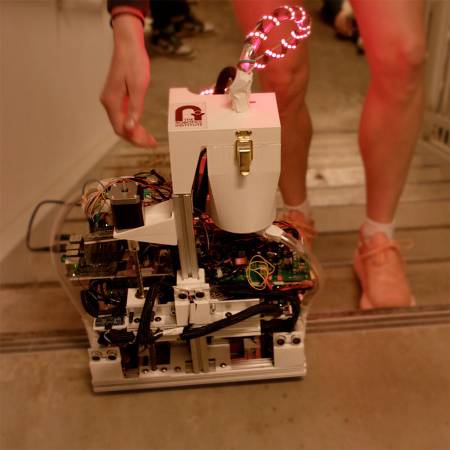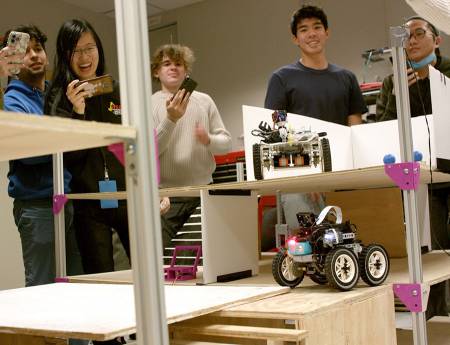Our newest primary major
Housed within the School of Computer Science, the Bachelor of Science in Robotics (BSR) emphasizes problem solving and “systems thinking” across disciplines and domains. Carnegie Mellon University announced the creation of this new primary major in the field of robotics starting in Fall 2023.
Robotic technology can make cars and airplanes safer or help people with physical limitations lead healthier, richer lives at home. Robotics can clean up damaged nuclear reactors, explore the surfaces of other planets or enable sustainable agriculture. Robots can change the world for the better.
At CMU, students will learn to use robotics to solve real-world problems while mastering core concepts of computer science including data structures and programming.
While learning how to work effectively as part of an interdisciplinary team, students will also explore the greater ethical and societal implications of robotics and build critical communication and presentation skills.


Core Concepts
Typical Robotics Major Pathway
For full list of courses and descriptions see the Robotics Program Course Catalog
First Year Fall Courses
| Course Code | Course Title | Units |
|---|---|---|
| 07-128 | First Year Immigration Course | 1 |
| 15-122 | Principles of Imperative Computation | 12 |
| 15-151 | Mathematical Foundations for Computer Science | 12 |
| (or) 21-127 Concepts of Math | ||
| 21-122 | Integration and Approximation | 10 |
| 76-101 | Freshman Writing Requirement | 9 |
| 99-101 | Computing @ Carnegie Mellon | 3 |
| Total: | 47 | |
First Year Spring Courses
| Course Code | Course Title | Units |
|---|---|---|
| 16-170 | Concepts of Robotics | 5 |
| 15-213 | Introduction to Computer Systems | 12 |
| 21-241 | Matrices and Linear Transformations | 11 |
| xx-xxx | GenEd – Science & Engineering Elective | 9 |
| xx-xxx | GenEd – Economic, Political & Social Inst. | 9 |
| Total: | 46 | |
Second Year Fall Courses
| Course Code | Course Title | Units |
|---|---|---|
| 16-220 | Intro to Robotics Building Practices | 12 |
| 36-xxx | Probability (36-218 or 36-225) | 9 |
| 16-211 | RoboMath | 12 |
| xx-xxx | GenEd – Cognition, Choice & Behavior | 9 |
| Total: | 42 | |
Second Year Spring Courses
| Course Code | Course Title | Units |
|---|---|---|
| 16-299 | Intro to Planning and Control | 12 |
| 16-311 | General Robotic Systems | 12 |
| 15-251 | Great Ideas in Theoretical Computer Science | 12 |
| xx-xxx | GenEd – Cultural Analysis | 9 |
| Total: | 45 | |
Third Year Fall Courses
| Course Code | Course Title | Units |
|---|---|---|
| 16-384 | Robot Kinematics and Dynamics | 12 |
| 16-385 | Computer Vision | 12 |
| xx-xxx | Humanities / Arts Elective | 9 |
| xx-xxx | Humanities / Arts Elective | 9 |
| xx-xxx | Free Elective | 9 |
| Total: | 51 | |
Third Year Spring Courses
| Course Code | Course Title | Units |
|---|---|---|
| 16-xxx | RI Elective | 12 |
| 16-xxx | RI Elective | 10 |
| xx-xxx | GenEd – Science & Engineering Elective (3 of 4) | 9 |
| xx-xxx | GenEd – Humanities and Arts Elective (2 of 3) | 9 |
| Total: | 45 | |
Fourth Year Fall Courses
| Course Code | Course Title | Units |
|---|---|---|
| 16-450 | Systems Engineering | 12 |
| xx-xxx | Ethics Elective | 9 |
| xx-xxx | GenEd – Science & Engineering Elective (4 of 4) | 9 |
| xx-xxx | RI Elective (3) | 10 |
| Total: | 40 | |
Fourth Year Spring Courses
| Course Code | Course Title | Units |
|---|---|---|
| 16-474 | Robotics Capstone | 12 |
| xx-xxx | SCS Elective | 10 |
| xx-xxx | GenEd – Humanities and Arts Elective (3 of 3) | 9 |
| xx-xxx | Free Elective (3) | 9 |
| Total: | 40 | |
Electives for the BSR
10-315 Introduction to Machine Learning (SCS Majors)
11-344 Machine Learning in Practice
15-281 AI: Representation and Problem Solving
15-387 Computational Perception
15-424 Logical Foundations of Cyber-Physical Systems
15-462 Computer Graphics
15-463 Computational Photography
15-482 Autonomous Agents
15-491 Special Topic: CMRoboBits: AI and Robots for Daily-Life Problems
16-264 Humanoids
16-322 Modern Sensors for Intelligent Systems
16-350 Planning Techniques for Robotics
16-362 Mobile Robot Algorithms Laboratory
16-385 Computer Vision
16-423 Designing Computer Vision Apps
16-467 Introduction to Human Robot Interaction
16-597 Undergraduate Reading and Research
16-745 Optimal Control and Reinforcement Learning
16-761 Mobile Robots
18-349 Introduction to Embedded Systems
18-500 ECE Design Experience
18-578 Mechatronic Design
24-480 Special Topics: Artificial Intelligence and Machine Learning for Engineering
24-671 Electromechanical Systems Design
24-677 Modern Control Theory
24-771 Linear Systems
85-370 Perception
85-395 Applications of Cognitive Science
85-412 Cognitive Modeling
85-419 Introduction to Parallel Distributed Processing
85-426 Learning in Humans and Machines
Program Learning Objectives
Unlock boundless possibilities through our transformative program. Delve into the following concepts and more, empowering you to lead groundbreaking innovations and shape the future of technology. Embrace this opportunity to unleash your full potential!
-
Solve Real-World ProblemsLearn how to use robotics to tackle real-world challenges and drive solutions.
-
Master Core ConceptsDeepen your understanding of computer science fundamentals.
-
Mathematical FundamentalsGain expertise in the mathematics essential for robotics.
-
Algorithmic ConceptsAcquire knowledge of robotics algorithms and machine learning.
-
Robotics ComponentsExplore the various components that make up robotic systems.
-
Design and PrototypeHands-on experience in designing and prototyping robots.
-
Interdisciplinary TeamsCollaborate effectively in diverse teams for innovative solutions.
-
Ethical ImplicationsUnderstand the ethical considerations in robotics technology.
-
Communication SkillsDevelop effective communication and presentation abilities.
In-Depth from Day One
Built upon a solid foundation of mathematical fundamentals permeating robotic systems known as “RoboMath”, the Bachelor of Science in Robotics will provide the opportunity for undergraduate students to master algorithms and use them to design, prototype, fabricate, and test their own robots.
The curriculum includes courses that provide a deeper understanding of control, movement, sensors, systems engineering and cognition and reasoning.
In the Lab: Our World-Class Facilities
In addition to our exceptional faculty, Carnegie Mellon offers robotics students an incredible array of labs and research facilities in which to learn, innovate, and explore. With more than 40 labs and groups on campus, students immerse themselves in hands-on learning and gain a deeper understanding of robotics alongside peers and leaders in the field.
To explore some of the exciting projects currently under development at Carnegie Mellon’s Robotics Institute, visit our labs page.
Exciting, Challenging Courses
It all begins with Intro to Robotics (16-311) where students are encouraged to vigorously explore major concepts. Some of the most well-known projects are the creation of individual Rube Goldberg machines and a miniaturized Urban Search and Rescue mission. Other courses, like Robot Kinematics and Dynamics (16-384), currently explore methods of controlling the Hebi robotic arm, among other topics.
Interested?
Interested in applying? Head to the application information page.